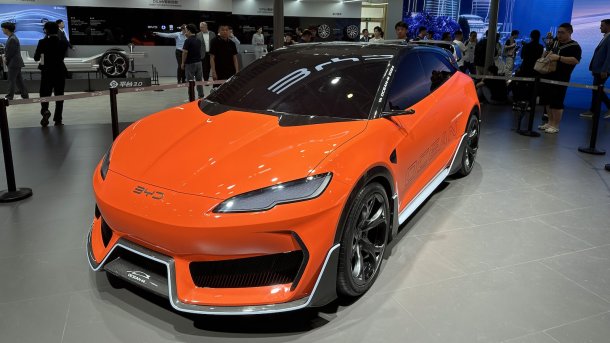Auto China 2024: Manufacturers Unveil a Firework of New Innovations
At the biggest car show of the year in Beijing, hopes for the world's largest market are palpable. The Europeans are trying to keep up with BYD, Geely and Saic.

- Stefan Grundhoff
Auto China takes place every year in April, alternating between the megacities of Beijing and Shanghai. At the first new international edition after a three-year Covid break in 2023 in Shanghai, the European manufacturers remained inconspicuous, while the Chinese brands delivered a firework display of new products. This year too, European manufacturers, whether volume or premium brands, with their gigantic development efforts and high production costs, have little to counter the current pace in China.
Volkswagen wants to return to the top
With a view to the world's most important car market, they need to become not only faster, but also leaner, cheaper and more efficient. Volkswagen wants to regain its top position in China, which the Chinese manufacturer BYD - Build Your Dreams - took from them last year for the first time in over three decades. Thanks to growth of around 40 percent, BYD sold over 2.5 million vehicles on its home market last year, overtaking Volkswagen, which still managed to sell just under 2.3 million.
Toyota came in a distant third, with Honda and Changan also selling more than one million vehicles. Audi was the only premium brand to achieve double-digit growth, although it remained just behind Mercedes and BMW. Tesla offers the best-selling electric car on the Chinese market, the Model Y, which currently occupies third place in the overall sales statistics. The electric SUV, manufactured near Shanghai, is followed by BYD Song and BYD Yin - two compact cars from China.
Renaissance of plug-in hybrids
Despite all the electric trends, the Chinese market is experiencing a renaissance of plug-in hybrids. Pure electric models are now having a hard time with many domestic brands. Plug-in hybrid models alone accounted for more than 2.6 million new registrations in China in 2023. At market leader BYD, for example, almost every second vehicle sold in the country is a plug-in hybrid. However, Volkswagen currently offers hardly any hybrid models in China. At Li Auto, an up-and-coming supplier with luxury aspirations, the figure is 14 percent. Many European manufacturers who would have preferred to concentrate on electric cars will probably have to extend their part-time electric vehicles or even develop new ones. Some Chinese PHEVs manage 120 km electrically before the combustion engine kicks in.
Auto China 2024 (11 Bilder)

WeChat moves in
What is also increasing the pressure on many European manufacturers is the great importance of digitalization. Large displays with friendly smiling avatars are more important than ever, as is the maximum integration of the WeChat chat service into the car. In China, WeChat can not only be used to chat electronically, but also to pay for everything and network numerous functions in everyday life. The problem here is that even the large corporations VW, Toyota, Renault-Nissan, Hyundai, Ford and General Motors can only use their international technology platforms to a limited extent and the premium brands in particular are sometimes significantly behind the Chinese manufacturers in this field. Almost all brands are therefore in the process of significantly expanding their Chinese development centers themselves or with local partners.
Long version for China
"The Chinese market is of central importance for Audi's transformation into a leading global provider of premium electric mobility," says Audi CEO Gernot Döllner, "with the new plant in Changchun, locally developed electric models and state-of-the-art digital offerings tailored to user needs, we are consistently pursuing our plan for sustainable success in China." Audi is presenting the all-important Q6L e-tron long-wheelbase version in China.
The situation is no different at Mercedes. The Swabians operate the company's largest production facility and its most important research and development center outside Germany in China. It plays a key role in Mercedes-Benz's global research and development network. In recent years, Mercedes-Benz has steadily expanded its research and development in China, particularly in the areas of electrification and digitalization. At the show, Mercedes intends to shine with its electric G-Class. Also on show: the new Mercedes-AMG GT 63 S E-Performance and the near-series preview of the upcoming Mercedes CLA- powered purely by electricity. Mini is already one step ahead and is unveiling the production version of the Aceman in Beijing.
(mho)